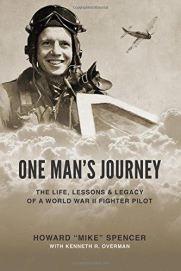This article appeared in the Ponte Vedra Recorder September, 2016. Photo is courtesy of Tom Spencer. The article may be read on the Recorder’s website here.

Published March, 2017
When Howard “Mike” Spencer started to wobble, he stretched his arms wide until he regained his balance. “Easy now … that’s right,” he muttered as he placed one foot in front of the other. Minutes later, he reached the end of his 10-foot balance beam. He hopped to the living room floor and smiled.
“There. Not bad for a 95-year-old, huh?”
I agreed. As a World War II veteran, this Ponte Vedra resident is in surprisingly good shape. He attributes his robust constitution to regular exercise, reading, a healthy social life … and a martini every day around 5 o’clock. His recent projects include analyzing brain functions and learning Chinese.
“In my spare time,” he quipped.
Mike has done a lot in his past and often says he is very happy with his life today. Recently, however, he wonders what kind of legacy he’ll leave when he’s gone.
“When I’m about a 110,” he laughed.
Then with a serious note: “Most of my friends and fellow vets are dead, but I’m still here and I’d like to tell others what I did in the war while I still can.”
As a fighter pilot and recipient of the Distinguished Flying Cross, Mike hopes to preserve the memories for younger generations by writing his memoir. Of course, he’ll reminisce about the air war over Germany and strafing enemy trains, but he also wants to inspire younger generations on the joys of growing old.
“Or how to live that long in the first place,” he said.
With so much to say in so little time, Mike did what more and more retired men and women are doing lately: He hired a ghostwriter.
A growing genre
Mike’s desire to write his legacy is not unique. Storytelling is as old as the ancient campfire: a hunting party relaxing at the end of the day, or villagers huddling close to stay warm. Invariably, someone told a story to pass the time. Today, the urge to spin a tale is just as strong, and the only difference is the kind of stories we tell.
In recent years, the English-speaking world has trended toward the biographical genre. While fiction may always be the primary choice of readers, the growing demand for autobiographies and memoirs is unmistakable. One reason for the change is sheer numbers: Due to the advent of “indie” (independent) publishing, there are more of them to read than ever before. Now Main Street folks can publish their life story quickly, professionally and at a surprisingly low cost. If an author puts in the work, an indie book can be on display through Amazon for as little as $400.
So, who wants to read about an ordinary person’s life except family and friends? More than you might think. Consider that every individual is a witness to history. If they lived through eras like the Great Depression, World War II, Vietnam, 9/11, Iraq, Afghanistan, the Great Recession, or events in the Middle East, their first-hand account provides greater understanding of those events not found in mainstream media. Mark Twain’s saying, “There is no such thing as an ordinary life” was confirmed in a recent internet poll, where hundreds responded to the question, “Why do you read biographies?” Most responses went something like this:
“They’re such wondrous, tragic, heroic, ordinary lives.”
“I love to read about the real struggles of real people.”
“An individual’s life reveals universal truths about the human condition.”
“I love to read about the real struggles of real people, and their different paths of life.”
In his award-winning book, “Biography: A Brief History,” Nigel Hamilton tracked the popularity of the biography. He observed that, “Biography — that is to say, our creative and non-fictional output devoted to recording and interpreting real lives — has enjoyed an extraordinary renaissance in recent years.” Hamilton also maintains that biography is now the most popular form of non-fiction writing today.
Hamilton’s findings bridge generations as well. In their article titled “Imagination, Cognition, and Personality,” researchers J. Barnes and E. Bernstein found that children actually preferred reading non-fiction over fiction or fantasy. Apparently, the lives of others are more interesting than make-believe.
Corporate biographies
Biography doesn’t begin and end with an individual. More and more companies hire professional biographers to record what amounts to a full-length brochure with an unlimited shelf life. In its first week on sale, Walter Isaacson’s biography of Apple co-founder Steve Jobs sold 379,000 copies in the U.S., making it by far the top-selling book in the country in 2011. Granted, Apple Inc. already has worldwide brand recognition, but a business doesn’t need to be famous to tell its story.
A local example is Buck Autrey, chairman emeritus of Miller Electric Company in Jacksonville, who recently published his autobiography, “Bucking the Trend.” His ghostwritten book details the company’s origin, growth, mission and philosophy, including many years of struggle. As Buck said, “Overcoming problems made us strong, so we definitely want to tell that part of the story as well as the good stuff.”
Mike’s book will be out soon. As he recently said with a twinkle, “I’m pushing 96, so I guess I’d better speed it up.” “A Walk in the Clouds” will describe his life of learning, curiosity, adventure and a great deal of love. According to Mike, talking about his past has been more fun than he thought, saying the process also had a cathartic effect on him. Digging deep in the past is a healing process, something that can benefit everyone.
